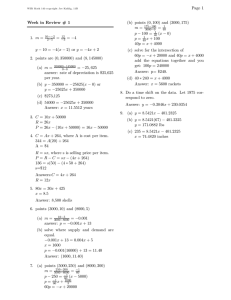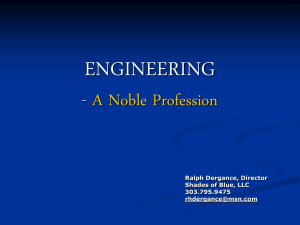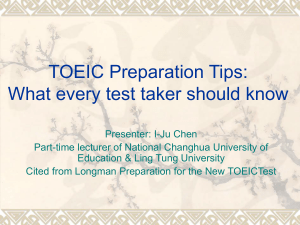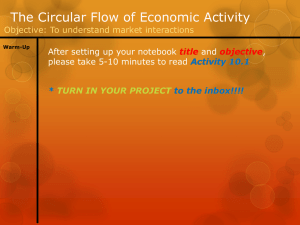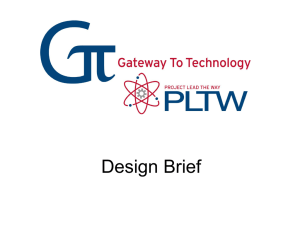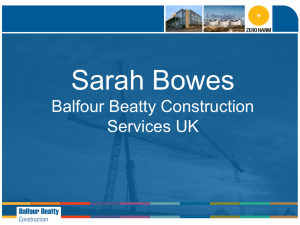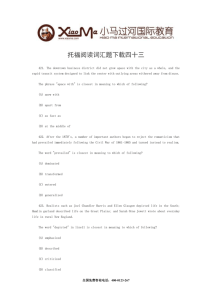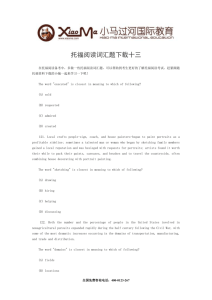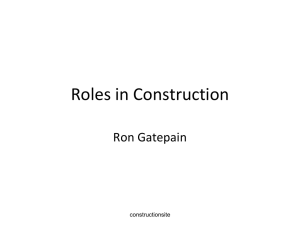Chapter 2, Problem 1. Find the correct numerical value for the
advertisement
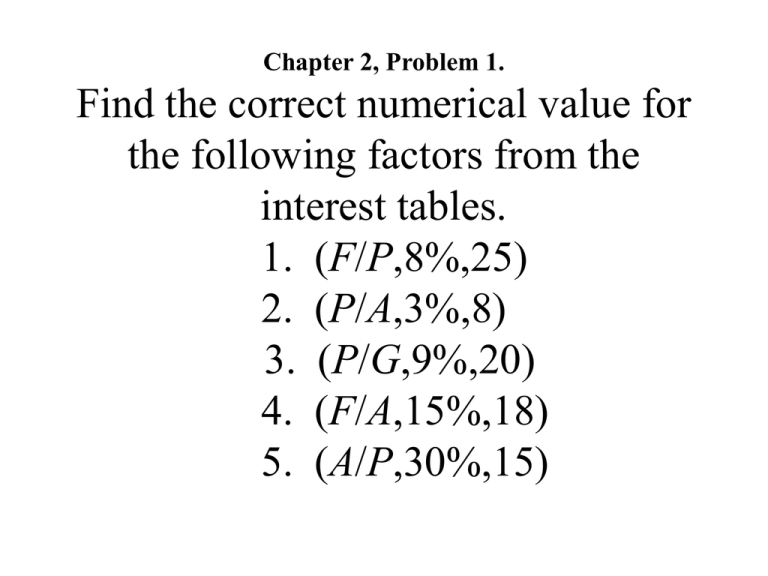
Chapter 2, Problem 1.
Find the correct numerical value for
the following factors from the
interest tables.
1. (F/P,8%,25)
2. (P/A,3%,8)
3. (P/G,9%,20)
4. (F/A,15%,18)
5. (A/P,30%,15)
Chapter 2, Solution 1.
1. (F/P,8%25) = 6.8485
2. (P/A,3%,8) = 7.0197
3. (P/G,9%,20) = 61.7770
4. (F/A,15%,18) = 75.8364
5. (A/P,30%,15) = 0.30598
Chapter 2, Problem 3.
Pressure Systems, Inc., manufactures
high-accuracy liquid-level transducers. It
is investigating whether it should update
certain equipment now or wait to do it
later. If the cost now is $200,000, what
will the equivalent amount be 3 years
from now at an interest rate of 10% per
year?
Chapter 2, Solution 3.
F = 200,000(F/P,10%,3)
= 200,000(1.3310)
= $266,200
Chapter 2, Problem 6.
Thompson Mechanical Products is planning to
set aside $150,000 now for possibly replacing
its large synchronous refiner motors whenever
it becomes necessary. If the replacement isn’t
needed for 7 years, how much will the
company have in its investment set-aside
account if it achieves a rate of return of 18%
per year?
Chapter 2, Solution 6.
F = 150,000(F/P,18%,7)
= 150,000(3.1855)
= $477,825
Chapter 2, Problem 10.
What is the present worth of a
future cost of $162,000 to
Corning, Inc., 6 years from now
at an interest rate of 12% per
year?
Chapter 2, Solution 10.
P = 162,000(P/F,12%,6)
= 162,000(0.5066)
= $82,069
Chapter 2, Problem 14.
The current cost of liability
insurance for a certain consulting
firm is $65,000. If the insurance cost
is expected to increase by 4% each
year, what will be the cost 5 years
from now?
Chapter 2, Solution 14.
F = 65,000(F/P,4%,5)
= 65,000(1.2167)
= $79,086
Chapter 2, Problem 18.
How much money could RTT Environmental
Services borrow to finance a site reclamation
project if it expects revenues of $280,000 per
year over a 5-year cleanup period? Expenses
associated with the project are expected to be
$90,000 per year. Assume the interest rate is
10% per year.
Chapter 2, Solution 18.
P = (280,00090,000)(P/A,10%,5)
= 190,000(3.7908)
= $720,252
Chapter 2, Problem 25.
Find the numerical value of the
following factors by (a) interpolation and
(b) using the appropriate formula.
1. (P/F,18%,33)
2. (A/G,12%,54)
Chapter 2, Solution 25.
(a) 1. Interpolate between n = 32 and n = 34:
1/2 = x/0.0014
x = 0.0007
(P/F,18%,33) = 0.0050 – 0.0007 = 0.0043
2. Interpolate between n = 50 and n = 55:
4/5 = x/0.0654
x = 0.05232
(A/G,12%,54) = 8.1597 + 0.05232 = 8.2120
(b) 1. (P/F,18%,33) = 1/(1+0.18)33 = 0.0042
2. (A/G,12%,54) = {(1/0.12) – 54/[(1+0.12)54 –1}
= 8.2143
Chapter 2, Problem 27.
A cash flow sequence starts in year 1 at
$3000 and decreases by $200 each year
through year 10. (a) Determine the value
of the gradient G; (b) determine the
amount of cash flow in year 8; and (c)
determine the value of n for the gradient.
Chapter 2, Solution 27
(a) G = $200 (b) CF8 = $1600
(c) n = 10
Chapter 2, Problem 38.
A start-up direct marketer of car parts expects
to spend $1 million the first year for
advertising, with amounts decreasing by
$100,000 each year. Income is expected to be
$4 million the first year, increasing by
$500,000 each year. Determine the equivalent
annual worth in years 1 through 5 of the
company’s net cash flow at an interest rate of
16% per year.
Chapter 2, Solution 38.
A = [4 + 0.5(A/G,16%,5)] – [1 –
0.1(A/G,16%,5)
= [4 + 0.5(1.7060)] – [1 –0.1(1.7060)]
= $4,023,600
or; find the PW of inflows and Outflows then
calculate corresponding A as I demonstrated this
solution method in class
Chapter 2, Problem 40.
A chemical engineer planning for her
retirement will deposit 10% of her salary each
year into a high-technology stock fund. If her
salary this year is $60,000 (i.e., end of year 1)
and she expects her salary to increase by 4%
each year, what will be the present worth of
the fund after 15 years if it earns 4% per year?
Chapter 2, Solution 40.
For
g = i,
P = 60,000(0.1)[15/(1 + 0.04)]
= $86,538
Chapter 2, Problem 47.
A northern California consulting firm wants to
start saving money for replacement of
network servers. If the company invests
$3000 at the end of year 1 and increases the
amount invested by 5% each year, how much
will be in the account 4 years from now if it
earns interest at a rate of 8% per year?
Chapter 2, Solution 47.
Find P and then convert to F.
P = 3000{1 – [(1+0.05)4/(1+0.08)4}]}/(0.08 –0.05)
= 3000{3.5522}
= $10,657
F = 10,657(F/P,8%,4)
= 10,657(1.3605)
= $14,498
Chapter 2, Problem 49.
What compound interest rate per
year is equivalent to a 12% per
year simple interest rate over a
15-year period?
Chapter 2, Solution 49.
Simple: Total interest = P(0.12)(15) = 1.8P
Compound: Total interest = P(1-i)^15-P
Total(simp.)=Total(comp.)
P(1-i)^15-P = 1.8P
(1-i)^15=2.8
i = 7.11%
(compounding rate)
Chapter 2, Problem 52.
An investment of $600,000
increased to $1,000,000 over a 5year period. What was the rate of
return on the investment?
Chapter 2, Solution 52.
1,000,000 = 600,000(F/P,i,5)
(F/P,i,5) = 1.6667
i = 10.8% (Excel)
Chapter 2, Problem 55.
A new company that makes mediumvoltage soft starters spent $85,000 to
build a new website. Net income was
$30,000 the first year, increasing by
$15,000 each year. What rate of return
did the company make in its first 5
years?
Chapter 2, Solution 55.
85,000 = 30,000(P/A,i,5) +
15,000(P/G,i,5)
Solve for i by trial and error or
spreadsheet:
i = 50%
(Excel)
Chapter 2, Problem 58.
An engineer who invested very well
plans to retire now because she has
$2,000,000 in her ORP account. How
long will she be able to withdraw
$100,000 per year (beginning 1 year
from now) if her account earns interest at
a rate of 4% per year?
Chapter 2, Solution 58.
2,000,000 = 100,000(P/A,4%,n)
(P/A,4%,n) = 20.000
From 4% table, n is between 40 and
45 years; by spreadsheet, 42 > n > 41
Therefore, n = 41 years
Chapter 2, Problem 61.
How many years will it take for a
uniform annual deposit of size A
to accumulate to 10 times the size
of a single deposit if the rate of
return is 10% per year?
Chapter 2, Problem 61.
10A = A(F/A,10%,n)
(F/A,10%,n) = 10.000
From 10% table, n is between 7 and
8 years; therefore, n = 8 years
Chapter 2, Solution 65.
160 = 235(P/F,i,5)
(P/F,i,5) =0.6809
From tables, i = 8%
Answer is (c)
Chapter 2, Problem 67.
The winner of a multistate megamillions lottery
jackpot worth $175 million was given the option of
taking payments of $7 million per year for 25 years,
beginning 1 year now, or taking $109.355 million
now. At what interest rate are the two options
equivalent to each other?
(a) 4%
(b) 5%
(c) 6%
(d) 7%
Chapter 2, Solution 67.
109.355 = 7(P/A,i,25)
(P/A,i,25) = 15.6221
From tables, i = 4%
Answer is (a)
Chapter 2, Problem 70.
An engineer deposits $8000 in year 1, $8500
in year 2, and amounts increasing by $500 per
year through year 10. At an interest rate of
10% per year, the present worth in year 0 is
closest to
(a) $60,600
(b) $98,300
(c) $157,200
(d) $173,400
Chapter 2, Solution 70.
P = 8000(P/A,10%,10) +
500(P/G,10%,10)
= 8000(6.1446) + 500(22.8913)
= $60,602.45
Answer is (a)
Chapter 2, Problem 77.
Simpson Electronics wants to have $100,000
available in 3 years to replace a production line. The
amount of money that would have to be deposited
each year at an interest rate of 12% per year would
be closest to
(a) $22,580
(b) $23,380
(c) $29,640
(d) Over $30,000
Chapter 2, Solution 77.
A = 100,000(A/F,12%,3)
= 100,000(0.29635)
= $29,635
Answer is (c)
Chapter 2, Problem 78.
A civil engineer deposits $10,000 per year
into a retirement account that achieves a rate
of return of 12% per year. The amount of
money in the account at the end of 25 years is
closest to
(a) $670,500
(b) $902,800
(c) $1,180,900
(d) $1,333,300
Chapter 2, Solution 78.
A = 10,000(F/A,12%,25)
= 10,000(133.3339)
= $1,333,339
Answer is (d)
Chapter 2, Problem 80.
Maintenance costs for a regenerative thermal
oxidizer have been increasing uniformly for 5
years. If the cost in year 1 was $8000 and it
increased by $900 per year through year 5, the
present worth of the costs at an interest rate of
10% per year is closest to
(a) $31,670
(b) $33,520
(c) $34,140
(d) Over $36,000
Chapter 2, Solution 80.
P = 8,000(P/A,10%,5) +
900(P/G,10%,5)
= 8,000(3.7908) + 900(6.8618)
= $36,502
Answer is (d)
